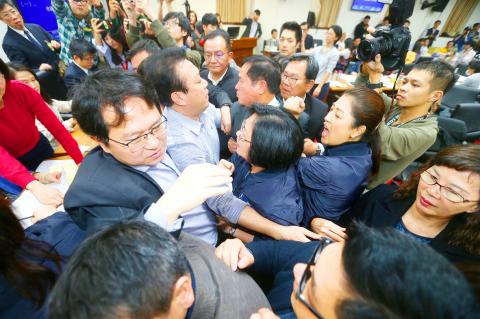The Democratic Progressive Party (DPP) yesterday received more criticism for failing to observe legislative procedures during a review on Monday of a controversial amendment to the Labor Standards Act (勞動基準法).
With the aim of the amendment going into effect early next year, the DPP hoped to push it through legislative committee review by Thursday at the latest to pave the way for its passage by Dec. 31.
The bill, which includes several revisions aimed at increasing flexibility for work hours, is highly controversial and strongly opposed by some labor groups.

Photo: CNA
Two of eight revisions were approved before the DPP decided just before 10pm on Monday to pass the remaining six as a package, in effect ramming them through committee review without discussion.
The measures are now to be sent for cross-party consultation, which can last up to a month, before the amendment can be voted on by a plenary session.
The lights in the committee room went out for about 60 seconds, adding to the bizarre day.
Earlier, during a scheduled daytime meeting, lawmakers scuffled with each other and a speaker was shoved from the podium before the meeting adjourned at 6:30pm.
DPP Legislator Lin Ching-yi (林靜儀), the committee’s convener, said the time allotted to each lawmaker to ask questions on each of the eight proposed articles would be no longer than six minutes.
One after another, opposition lawmakers questioned whether Lin was “overstepping her authority” as the convener by deciding on the time allotment, with Chinese Nationalist Party (KMT) Legislator Alicia Wang (王育敏) saying that there was no provision in written legislative procedures that imposes such a limit.
Lin did not respond to their concerns, telling them instead that they should “treasure” their time to ask questions about the amendments.
The fracas ensued, followed by the committee adjourning for a 30-minute break before resuming for the night session, which was originally scheduled to run until midnight.
Taipei Department of Labor Commissioner Lai Hsiang-lin (賴香伶) yesterday criticized the attempt to hastily pass the amendment, saying that it would leave local governments unprepared and that she was considering taking a few days off in a show of support with labor rights groups.
“The quality and procedure of the review held by the Legislative Yuan’s committee [on Monday] were unfortunate,” Lai said. “Such an important amendment to the law, which concerns work hours, should have accepted more opinions from different perspectives, including suggestions made by local governments and academics.”
Due to concerns about workers only having a required minimum of eight hours of rest between shifts, the previous amendment to the act extended the minimum rest time to 11 hours, which has not been enforced over the past year since its enactment, she said.
Loosening restrictions stipulated by the act puts part of the duty of monitoring labor conditions on local governments, such as requiring companies with more than 30 employees to report exceptional work conditions, Lai said, adding that local governments have very limited authority to conduct such monitoring.
The proposed amendment would allow the definition of exceptional work conditions to be decided through negotiations between workers and employers, she said, adding that whether local governments could impose fines on companies that do not provide meeting minutes as evidence has not been decided, meaning there is ambiguity in allowing self-management and enforcement of the regulations.
The Executive Yuan and the legislature should explain to the public why they are aiming to reduce the minimum rest time back to eight hours, she said.

Alain Robert, known as the "French Spider-Man," praised Alex Honnold as exceptionally well-prepared after the US climber completed a free solo ascent of Taipei 101 yesterday. Robert said Honnold's ascent of the 508m-tall skyscraper in just more than one-and-a-half hours without using safety ropes or equipment was a remarkable achievement. "This is my life," he said in an interview conducted in French, adding that he liked the feeling of being "on the edge of danger." The 63-year-old Frenchman climbed Taipei 101 using ropes in December 2004, taking about four hours to reach the top. On a one-to-10 scale of difficulty, Robert said Taipei 101

Nipah virus infection is to be officially listed as a category 5 notifiable infectious disease in Taiwan in March, while clinical treatment guidelines are being formulated, the Centers for Disease Control (CDC) said yesterday. With Nipah infections being reported in other countries and considering its relatively high fatality rate, the centers on Jan. 16 announced that it would be listed as a notifiable infectious disease to bolster the nation’s systematic early warning system and increase public awareness, the CDC said. Bangladesh reported four fatal cases last year in separate districts, with three linked to raw date palm sap consumption, CDC Epidemic Intelligence

US climber Alex Honnold left Taiwan this morning a day after completing a free-solo ascent of Taipei 101, a feat that drew cheers from onlookers and gained widespread international attention. Honnold yesterday scaled the 101-story skyscraper without a rope or safety harness. The climb — the highest urban free-solo ascent ever attempted — took just more than 90 minutes and was streamed live on Netflix. It was covered by major international news outlets including CNN, the New York Times, the Guardian and the Wall Street Journal. As Honnold prepared to leave Taiwan today, he attracted a crowd when he and his wife, Sanni,

Taiwanese and US defense groups are collaborating to introduce deployable, semi-autonomous manufacturing systems for drones and components in a boost to the nation’s supply chain resilience. Taiwan’s G-Tech Optroelectronics Corp subsidiary GTOC and the US’ Aerkomm Inc on Friday announced an agreement with fellow US-based Firestorm Lab to adopt the latter’s xCell, a technology featuring 3D printers fitted in 6.1m container units. The systems enable aerial platforms and parts to be produced in high volumes from dispersed nodes capable of rapid redeployment, to minimize the risk of enemy strikes and to meet field requirements, they said. Firestorm chief technology officer Ian Muceus said